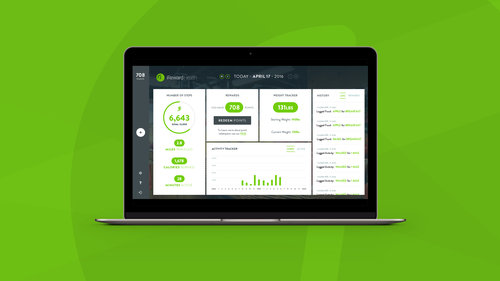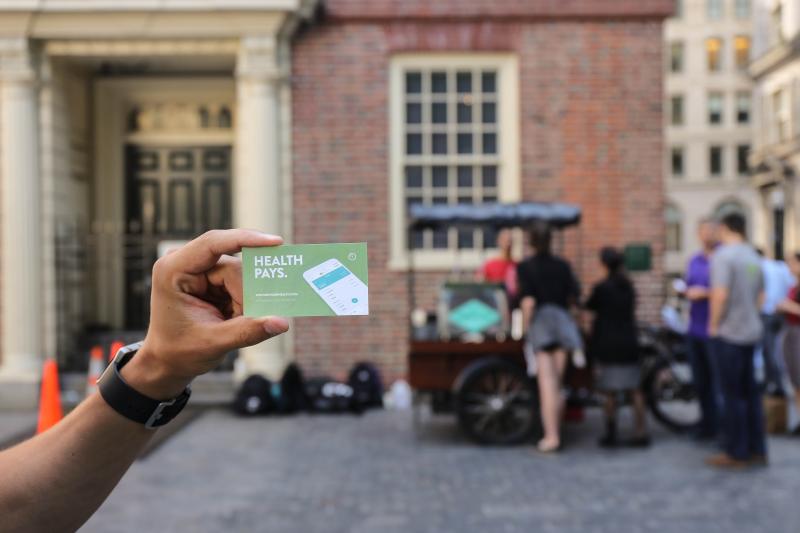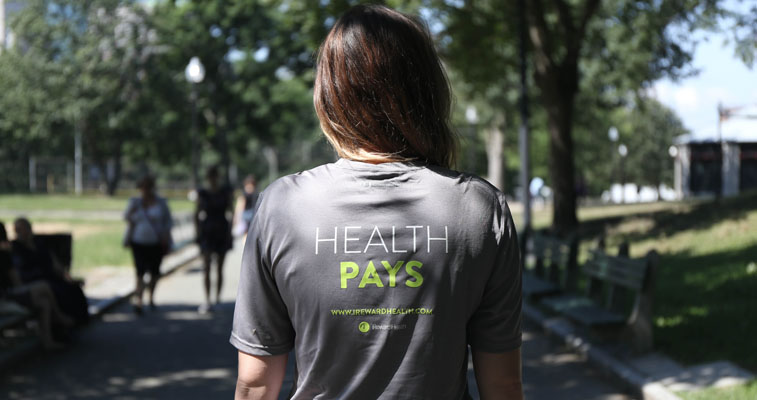As more employers realize the benefits of employee wellness, a number of solutions have popped up helping companies do things like host exercise competitions, offer nutritional tracking services and take part in other campaigns designed to promote healthy living.
The problem is that the people who gravitate toward self-tracking and fitness contests aren’t the people who stand to benefit from those kinds of things the most. For people who haven’t been living healthily, taking those first few steps toward lifestyle improvements can be intimidating, and actually sticking to those changes can seem practically impossible.
That’s why the team at iRewardHealth is taking a more informed approach to helping people get healthy. The founders of the company have merged behavioral science and medical expertise with machine learning to create a mobile app designed to build long term healthy habits personalized for each user.

“We focus on three main areas: Weight control, nutrition and stress reduction,” Alexandra Brillaud, the Creative Director at iRewardHealth, explains. “It’s kind of like training wheels for developing a healthy habit.”
iRewardHealth starts by customizing a dashboard for companies based on their wellness goals. Then the business puts a certain amount of money into a program, and the app uses small payments to reward users as they make choices that move them toward a sustainable, healthy living routine.
The software establishes a baseline for each user as they log activities like meals, runs, yoga sessions, and even stress relievers like playing the guitar or meditating. Once the system identifies areas where a user can improve, a machine learning algorithm develops a personalized incentive structure using points that are directly tied to cash.
The points are rewarded at certain key times, like immediately after a run, to maximize the effectiveness of the incentive.

“Our application uses extrinsic positive reinforcement to motivate people who are lacking sufficient intrinsic motivation to stay on track with healthy actions,” CEO and Co-Founder Rick McCartney, NP, says.
If a user develops a good habit but begins slacking in new areas, the algorithm adjusts itself accordingly. McCartney says it takes a person an average of 21 to 30 days to build a habit.
“The way the app works is you build a habit and you slowly stop being rewarded for it because you don’t need the extrinsic motivation, because now you have that intrinsic motivation and the habit is making you feel good by itself,” Brillaud says.
Employees can deposit the money earned through the app into their bank accounts whenever they want, and iRewardHealth takes 6% of all rewards cashed, meaning businesses only pay when the program is working.

McCartney and fellow co-founders Benjamin Silverman, MD, and Carmine DiChiara, PsyD, developed the idea while working together at a clinic helping patients struggling with problems like diabetes and obesity.
“One day [Benjamin] made a comment like ‘It would be great if we could just pay people to do this stuff and have a product that would help them associate those healthy behaviors with a good feeling, rather than something that’s hanging over their heads,’” Brillaud says.
The idea stuck as a promising way to make a difference in more people’s lives, and soon the team was developing a solution using research-backed reinforcement techniques to encourage healthy behaviors.
After receiving positive feedback from health insurance companies and a few large businesses, the founders officially launched the company in February of 2014. Since then the team has raised some seed money from friends, family members, and angel investors and gone through the Berlin, German-based accelerator Startupbootcamp.
“The incubator was excellent; there’s a lot of products in this space, so it helped us cut through the noise a little bit,” Brillaud says. “We met so many thought leaders in the industry and got tons of great feedback. It was also just fun to take on a new market and do things differently.”
Once the team got over the cultural and language hurdles, they secured partnerships with local businesses and two large insurance agencies they’ll work with on two pilot programs scheduled to begin in the next 18 months.
The team is also close to completing a clinical study showing the benefits of the app. A 2010 Harvard research study showed medical costs fall about $3.27 for every dollar spent on wellness programs. McCartney thinks iRewardHealth can build on that.

“Average ROI is generally around 5x investment, as long as the investment is a reasonable amount,” Rick says. “Our belief is that if you spend $300 inefficiently, and get a 5x return on investment, that we can provide a 3x as efficient delivery method and provide 15x ROI.”
iRewardHealth is B2B at the moment, and the team is also working to secure partnerships with insurance companies and academic institutions. Sometime this winter, the app will allow people to incentivize friends and family members.
The team has also discussed the possibility of using the app for alternative goals like financial literacy or company loyalty, but the main goal of the company has always been to help people improve their health and wellness.
“There are all sorts of ways that we can structure it,” Brillaud says. “But right now our goal is to help people take the first steps to changing their lives and building healthier habits. That’ll always be our big vision.”
Zach Winn is a contributor to VentureFizz. Follow Zach on Twitter: @ZachinBoston.
Images courtesy of iRewardHealth.

